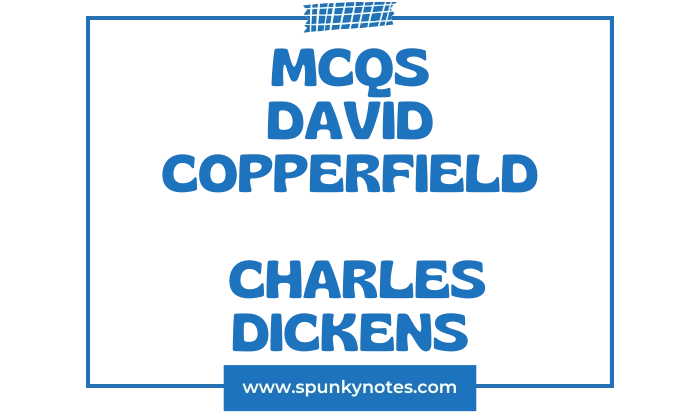

Estimated Reading Time: 17 min
David Copperfield MCQs
1. What was the initial asking price for David Copperfield’s caul?
A. Two pounds
B. Five shillings
C. Fifteen guineas
D. Ten shillings
2. The advertisement for the caul was withdrawn at a dead loss because the single bidder offered two pounds cash and the balance in what?
A. Coal
B. Sherry
C. Furniture
D. Tea
3. What was the Caul eventually won in a raffle by an old lady with a hand-basket?
A. A lottery
B. A bingo game
C. A raffle
D. An auction
4. What did Miss Betsey do to Mr. Chillip that was calculated to break his spirit?
A. She dismissed him abruptly
B. She scolded him openly
C. She uttered a snarl
D. She threw cotton at him
5. What historical event service did Miss Betsey have open in her Prayer-book during the christening?
A. The Burial Service
B. The Gunpowder Plot
C. The Matrimony Service
D. The Coronation Service
6. What combined smells were emitted from the dark store-room off Peggotty’s kitchen?
A. Wine and sawdust
B. Soap, pickles, pepper, candles, and coffee
C. Bread and milk
D. Mouldy fruit and spices
7. What animals were feeding in the churchyard that David saw from his window?
A. Deer
B. Cows
C. Sheep
D. Goats
8. Where did Peggotty propose taking David for a fortnight’s treat?
A. London
B. Salisbury
C. Yarmouth
D. Dover
9. How did Mr. Peggotty say Ham’s father (Joe) had died?
A. Drowndead
B. In a fever
C. In a foreign land
D. In a coaching accident
10. Who was Mrs. Gummidge?
A. Mr. Peggotty’s sister
B. The widow of Mr. Peggotty’s partner in a boat
C. David’s aunt
D. A local housekeeper
11. Mr. Murdstone’s stated satisfaction in marrying David’s mother?
A. That she was wealthy
B. That she was an experienced housekeeper
C. That she was artless, allowing him to form her character
D. That she had a large family
12. When David learned lessons under the Murdstones, what miscalled quality were they endeavoring to instill in his mother?
A. Piety
B. Humility
C. Firmness
D. Devotion
13. When David stumbled over his lesson, what did Mr. Murdstone tell his mother not to say?
A. Oh, Davy, Davy!
B. Try harder, dear.
C. Please be patient.
D. He’s tired.
14. The Murdstones’ treatment of David resulted in him becoming what, after about six months?
A. Sulky, dull, and dogged
B. Violent and rebellious
C. Confused and distraught
D. Clever and cunning
15. What kind of cane did Mr. Murdstone prepare by binding something around the bottom?
A. A heavy, thick cane
B. A lithe and limber cane
C. A bamboo stick
D. A decorative cane
16. Miss Murdstone compared the idea of flogging to what idea?
A. Being wise
B. Being firm
C. Being natural
D. Being sure
17. The ringing of bells, murmuring of voices, and footsteps on the stairs all made David feel more dismal in his solitude and disgrace than what other sounds?
A. Crying
B. Laughing, whistling, or singing outside
C. The clock striking
D. The wind
18. What was the punishment decided for David after the physical confrontation with Mr. Murdstone?
A. Being sent to the workhouse
B. Being sent to school near London
C. Being locked in his room
D. Being starved
19. David felt more solitary than whom, while waiting at the booking-office?
A. Alexander Selkirk
B. Robinson Crusoe
C. Tom Jones
D. Gil Blas
20. The clerk at the booking-office pushed David over to a man as if he were what?
A. Weighed, bought, delivered, and paid for
B. A troublesome parcel
C. Lost property
D. A piece of luggage
21. What warning was written on the placard tied to David’s back?
A. Take care of him. He is clumsy.
B. He is stubborn.
C. Take care of him. He bites.
D. He is a runaway.
22. Who was the man with the wooden leg who worked at Salem House?
A. Mr. Mell
B. Mr. Creakle
C. Tungay
D. J. Steerforth
23. What instrument did Mr. Mell play after putting up his things for the night?
A. The violin
B. The flute
C. The piano
D. The horn
24. Mr. Creakle claimed to have the happiness of knowing David’s what, whom he described as a worthy man?
A. Uncle
B. Grandfather
C. Father-in-law
D. Guardian
25. What object did Steerforth keep on the mantelpiece that he threatened to knock Mr. Creakle down with?
A. A seven-and-sixpenny ink-bottle
B. A marble bust
C. A cricket bat
D. A small knife
26. Steerforth promised to make David’s storytelling sessions at night into regular what?
A. Tragedies
B. Comedies
C. Arabian Nights
D. Histories
27. Who acted as a “sort of chorus” during the storytelling sessions?
A. Mr. Mell
B. Traddles
C. George Demple
D. Mr. Creakle
28. How did the boys generally abuse Mr. Mell when Mr. Creakle was absent?
A. Threw food at him
B. Mimicked his poverty, boots, coat, and mother
C. Ignored him completely
D. Locked him out of the room
29. Steerforth called Mr. Mell an impudent what, when confronting him?
A. Knave
B. Beggar
C. Tyrant
D. Fool
30. What did David’s visitors from Yarmouth bring as a “little relish” for him?
A. Cake and ale
B. Two prodigious lobsters, an enormous crab, and shrimps
C. Fresh fish and potatoes
D. A basket of apples
31. What was Mr. Barkis waiting for an answer to?
A. A letter
B. A declaration that “Barkis is willin'”
C. His travel plans
D. Peggotty’s name
32. What was Peggotty’s Christian name?
A. Agnes
B. Clara
C. Emily
D. Jane
33. What did David study on evenings, when he did not dare to read an entertaining book?
A. Architectural treatise
B. Hard-headed treatise on arithmetic
C. Latin grammar
D. Religious tract
34. What did the five thousand cheeses turn into during the lesson when David broke down?
A. Pounds
B. Canes
C. Calculations
D. Figures
35. What was the name of the establishment where David was forced to begin life on his own account?
A. Doctor Strong’s School
B. Salem House
C. Murdstone and Grinby’s
D. The King’s Bench
36. What was Mr. Micawber’s head compared to in appearance?
A. A turnip
B. An egg
C. A pumpkin
D. A polished apple
37. What was engraved on the great brass plate in the centre of Mrs. Micawber’s street door?
A. Apartments to let.
B. Mrs. Micawber’s Boarding Establishment for Young Ladies.
C. W. Micawber, Gentleman.
D. Debt Collector.
38. What did Mr. Micawber declare on coming home, sometimes, with a flood of tears?
A. That he was leaving
B. That nothing was now left but a jail
C. That he was reformed
D. That he was rich
39. Mr. Micawber’s financial philosophy stated that if annual expenditure exceeded twenty pounds by sixpence, the result was what?
A. Bankruptcy
B. Misery
C. Imprisonment
D. Suicide
40. What was the famous calculation Mr. Micawber often made, ‘in case anything turned up’?
A. The cost of a new business
B. The expense of putting bow-windows to the house
C. The price of a divorce
D. The interest on his debts
41. What profession did Mr. Waterbrook say Traddles was reading for?
A. Law
B. Medicine
C. Divinity
D. Architecture
42. What was the favorite topic of conversation among the genteel guests at the Waterbrook dinner party?
A. Architecture
B. Political Economy
C. Blood
D. The Classics
43. What animal did Miss Trotwood call Uriah Heep when telling him to control himself?
A. A serpent
B. A rat
C. An eel
D. A slug
44. Uriah Heep was raised at a foundation school for boys and got the monitor-medal by being what?
A. Clever
B. Strong
C. Humble
D. Respectful
45. Uriah threatened to use his sense of power over Wickfield to achieve what?
A. Gaining a partnership
B. Marrying Agnes
C. Destroying his reputation
D. Fleeing the country
46. Who was the most respectable-looking servant David observed at Mrs. Steerforth’s house?
A. The Native
B. Littimer
C. Tungay
D. Mr. Barkis
47. What was Em’ly’s impression of Steerforth’s dramatic shipwreck story?
A. She laughed hysterically
B. She saw it all before her
C. She found it boring
D. She thought it unsuitable
48. What did Miss Mowcher always carry and give away to young ladies as the best introduction?
A. Snuff
B. Scraps of the Russian Prince’s nails
C. Hairpins
D. Perfume bottles
49. What item of clothing did David’s aunt start wearing when she came to London after losing her fortune?
A. Widow’s weeds
B. Corduroy trousers
C. Linen robes
D. Sailor’s coat
50. What position had Mr. Micawber achieved in Australia, according to the Port Middlebay Times?
A. Colonial Solicitor
B. District Magistrate
C. Mayor
D. Governor
Brief Overview
David Copperfield is a novel written by Charles Dickens. It was first published in 1850 and is often considered his most autobiographical work. The story is told in the first person by David Copperfield, who narrates his life from childhood to adulthood.
David’s early life is full of struggles. His father dies before he is born, and his mother remarries a cruel man, Mr. Murdstone, who mistreats him.
After his mother’s death, David is sent to work in a factory in London, where he experiences poverty and loneliness. Later, he runs away to find his aunt, Betsey Trotwood, who kindly takes him in and provides him with a better life.
As David grows up, he studies, becomes a writer, and meets many interesting characters such as the kind-hearted Mr. Micawber, the loyal Peggotty family, and the deceitful Uriah Heep. Love, loss, and lessons about human nature shape his life.
In the end, David matures into a successful and compassionate man. David Copperfield is not only a story of personal success but also a powerful reflection on resilience, kindness, and the journey of self-discovery.


